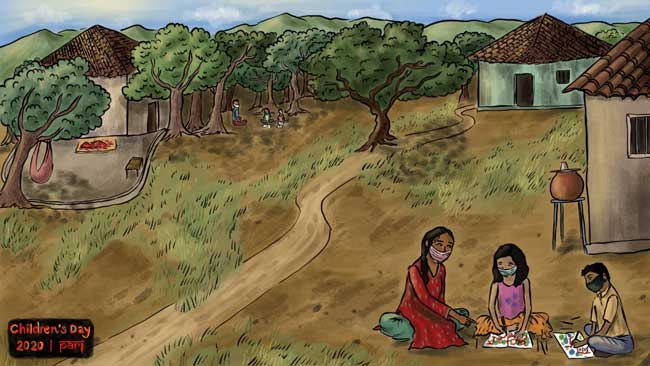Subscribe to Vidyodaya’s educational videos on YouTube: Kaathadi >>
Community mobilization in the times of CoVid-19
As a community, we are all sharing the experience of the CoVid-19 pandemic in different ways. For the tribal communities here, it has posed a direct threat to their health and livelihood with most of them losing their only source of income and struggling to keep their families hunger-free and safe. While the situation is overwhelming, we are also witnessing new ways of living and being together, of connection and generosity. This is giving us hope.
Our community health workers and village co-ordinators have been leading from the front in responding to the needs of all the tribals across 320 hamlets, putting their lives at-risk while ensuring the safety of others. With support from ASHWINI, ACCORD and VBVT, they have mobilized resources and distributed essential provision and medical supplies to 5498 tribal families. We are greatly inspired by their courage, determination and compassion. You can learn more about our CoVid-19 relief and resilience efforts here. And to engage children during the lockdown, we at the Vidyodaya Maths and Science Resource Centre have created a playlist of simple Science and Maths activities that children can do at home. You can access them here: English playlist, Tamil playlist.
Celebrating Science
As part of the National Science Day, a Science quiz was conducted for the children of Grades 4 and 5 at Vidyodaya school and a Science exhibition was held by the children at the SSA school.
The quiz had multiple rounds, covering themes on everyday Science, curriculum-based questions, identification of bird calls and hands-on activities. Surprisingly, children from kindergarten who were part of the audience also participated enthusiastically by identifying bird calls! The Science exhibition featured various Science & Maths experiments and Arts & Crafts creations — all conceptualized by the children themselves. This student-led exhibition was visited by parents, government officials and children from other schools as well.
The intent behind these events is to provide a platform for the children to showcase their talents and also create a space that builds their confidence, reflection and teamwork, without encouraging competition.
Parents as equal partners
In March, Parents Teachers meetings were conducted with the parents of the children of Grade 5 from Vidyodaya school and also with the parents of the children of Grade 8 from SSA school. They discussed about their plans and opportunities available for their children to continue their education, given both the batches of the students were graduating from our and will be joining new schools. The teachers also suggested ways in which they will continue supporting the parents and the children in this transition phase.
We believe that parents are equal partners with us in enabling learning for the children. By working in partnership with them, we hope to support them and strengthen their involvement in their child’s life.
Source: Greetings from Viswa Bharati Vidyodaya Trust (VBVT), Gudalur
Newsletter received y email (14 May 2020)

Related posts: how India’s tribal communities cope with the pandemic >>
Covering the human cost of Covid-19
The nationwide Covid-19 lockdown that started on March 25 [2020] has triggered distress for millions of ordinary Indians – stranded migrant workers, farmers, sugarcane cutters, Adivasis, Dalits, sanitation workers, construction labourers, cancer patients staying on city pavements, brick kiln labourers, pastoral nomads, and others. While many are on the brink with no work, income or food, several continue to work amid extremely hazardous conditions | Read about them in these PARI reports from across the country >>
“The educational establishment has entrenched interests within it for whom the improvement of Adivasi education is not a priority and who may even look down upon them as second-class citizens.” – Amman Madan, Rama Sastry and B Ramdas in “Social Movements and Educational Change: A Case Study of the Adivasi Munnetra Sangam” | Learn more >>